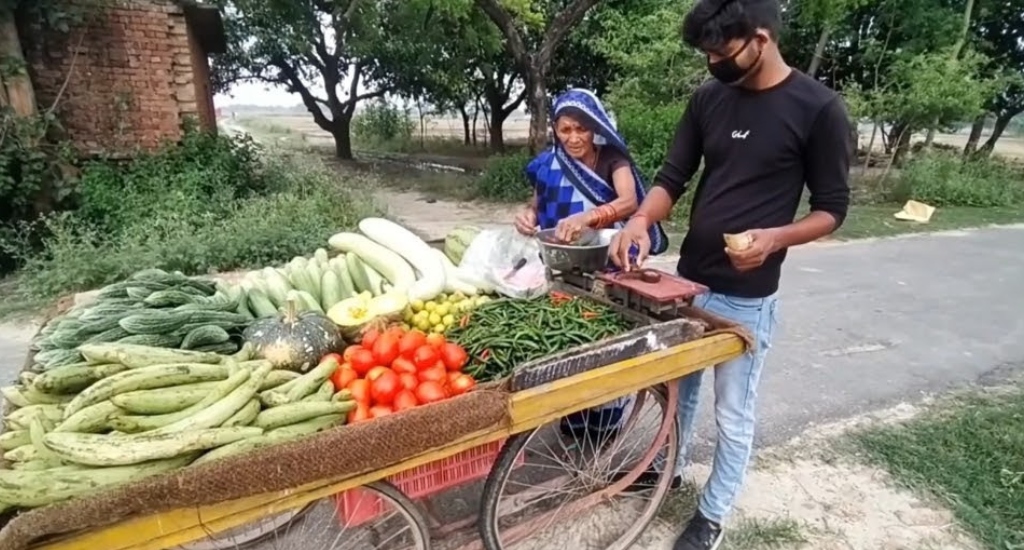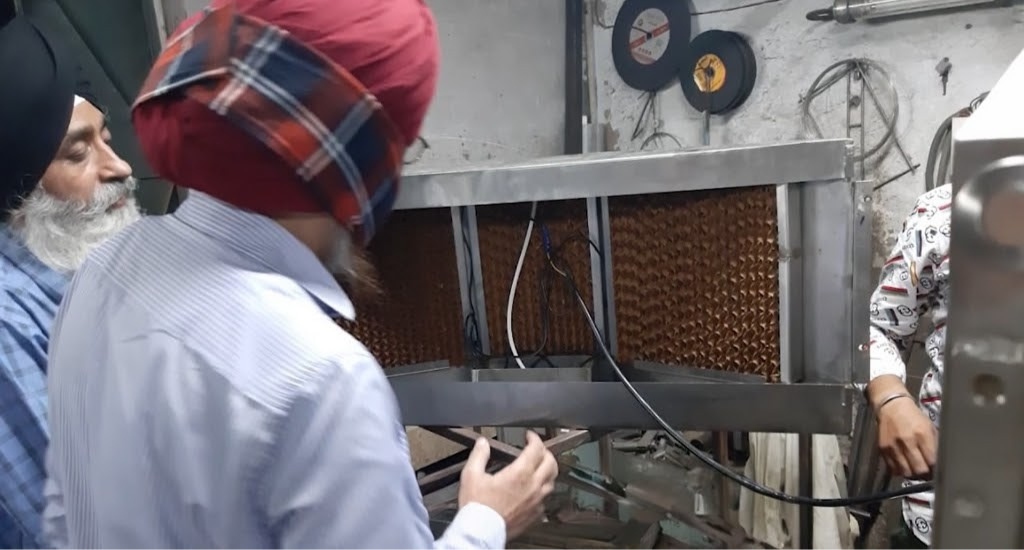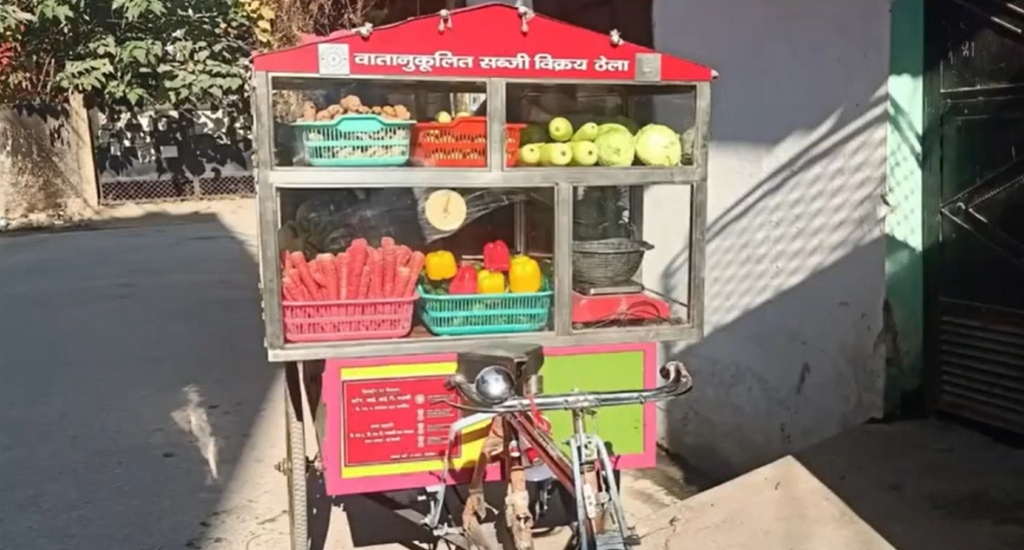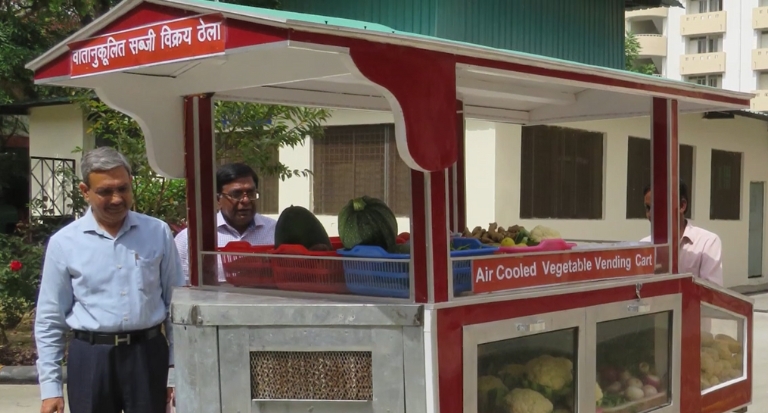Whether you live in a metropolitan city or a village, you are sure to hear the calls of hawkers who sell anything from vegetables to glass bangles. Vegetable hawkers sell fruits, vegetables and greens from an open pushcart. Since the wares are exposed to natural elements, the quality of the produce reduces by the hour, impacting the hawkers’ income.
But a simple innovative cooling method can help them keep the fruits and vegetables fresh for up to three days, preventing loss of income.
Sale of vegetables from pushcarts
While vegetables and fruits are sold in supermarkets and by delivery agencies that take orders online, the market for street hawkers still exists. These vendors get fresh produce from the wholesale market every day and use an open pushcart to sell vegetables.

As the vegetable vendors push their cart through residential colonies and rural streets, the vegetables remain exposed to outside temperatures. Since the hawkers sell during the day when the temperature is high most of the time, there is rapid deterioration in the quality of vegetables and fruits.
Also Read: Sun-dried vegetables find “flavour” in Kashmiri kitchens
It is estimated that the rate of spoilage of vegetables increases 2-3 times with each 10°C rise in temperature. Also, as the vendors’ routine involves moving about, they are unable to maintain appropriate quality of vegetables for more than two days in summer. If they are not able to sell all the vegetables and fruits in two days, they resort to selling the produce at throwaway prices. If they are unable to sell even after reducing the price, they end up discarding the fruits and vegetables as waste, incurring heavy loss.
Air-cooled pushcarts keep vegetables fresh
If the perishable vegetables can be kept at low temperature and high relative humidity, they can be stored for a longer period, especially during summer.
Among various methods, evaporative cooling is an environmentally-friendly air-cooling system where water and air are the working fluids.

One such model of air-cooled vegetable pushcart has been designed by IIT Roorkee under the RuTAG Crossfyre platform of Manthan, which is a government initiative. RuTAG Crossfyre is a science and technology driven business platform that bridges technology gaps and provides solutions at the grassroots level using locally available capabilities.
The design cart created under the initiative includes an air-cooled system for preserving vegetables. The cart’s cooling unit is based on the evaporative principle. Cool air rich in humidity is circulated in the storage area to cool it and to keep the required humidity. A battery is integrated for powering a DC pump for spraying water over pads and powering a DC fan for circulation of cool, moist air.
Also Read: 130 varieties and counting: Kerala taps tubers
The vendor can charge the battery at home each night and can use it throughout the day without any onboard charging. A small water tank of 10-15 litres capacity is attached for watering the pads.
Benefits of the new design
This new innovation is ideal for states such as Uttar Pradesh, Rajasthan, Maharashtra, Bihar and the plains of Uttarakhand, among others, in addition to places with dry, hot climate, except in coastal areas.
Data collected during the field trials show that the air-cooled pushcarts are efficient in keeping the fruits and vegetables fresh for 2-3 days.

Vegetables and fruits stored in the new air-cooled vegetable pushcart are more hygienic as the cart is enclosed. The cart is aesthetically designed and also includes a light, thanks to which the hawkers can sell their ware without any problem even when there is low light, as in the evenings and night.
The cart can also be designed as a tricycle. While the air-cooled vegetable pushcart costs Rs 35,000, the tricycle model costs Rs 50,000.
Two vegetable hawkers who were given the air-cooled pushcarts in Roorkee observed a significant increase in their income, and the customers’ satisfaction on getting fresh vegetables and fruits.
Also Read: Curbing malnutrition, one poshan vatika at a time
The Rutag Smart Village Centre (RSVC) Program, initiated under the Office of the Principal Scientific Adviser (PSA), GoI, aims to drive scientific and technological interventions in rural development. It focuses on enhancing livelihoods, sustainable agriculture, and innovation-driven solutions for rural communities.
The lead image on top shows vegetables and fruits being sold in an air-cooled pushcart. (Screengrab from a YouTube video of Office of the Principal Scientific Adviser to the Govt. of India)








